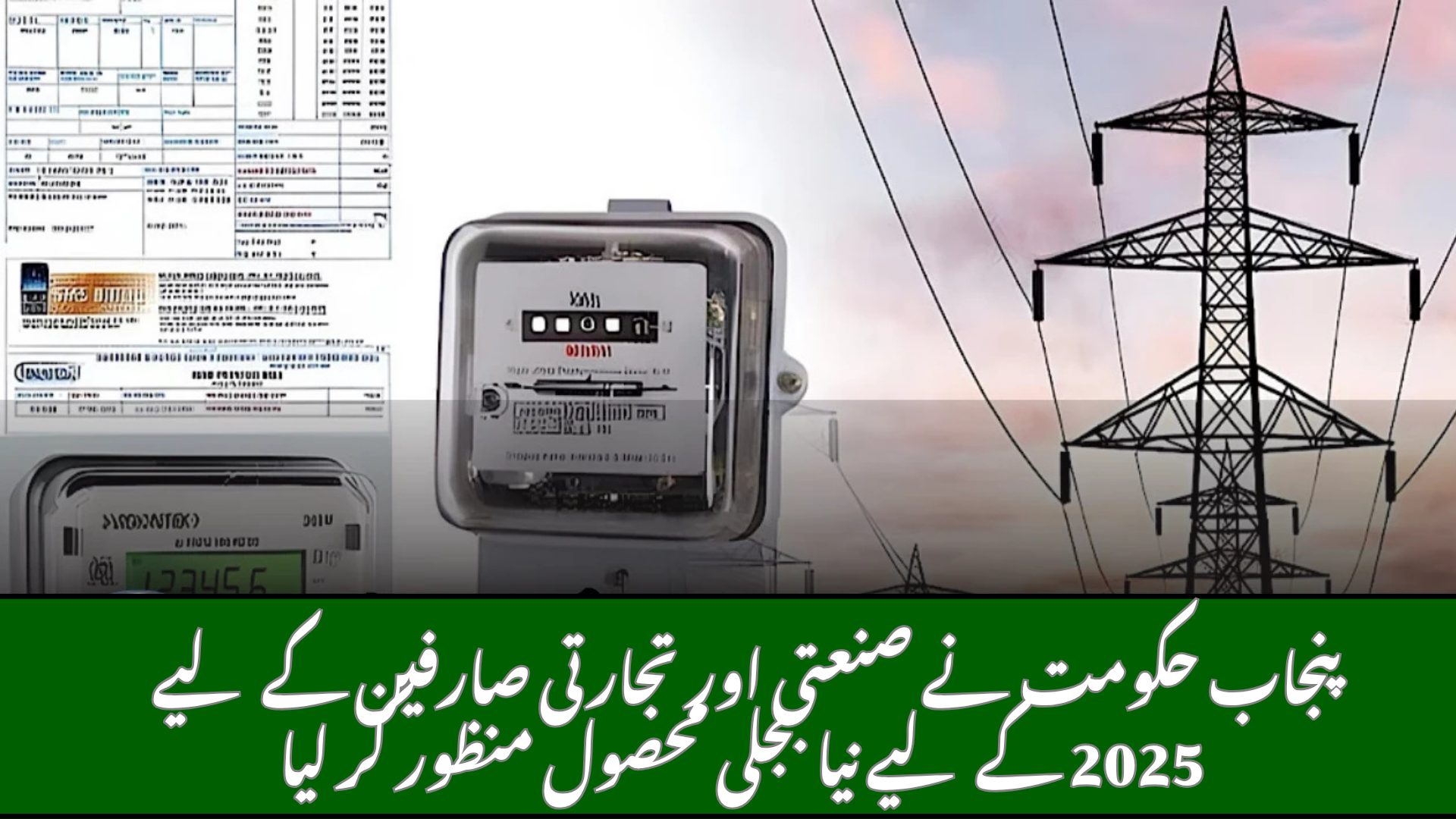Punjab Govt Approves New Electricity Duty. The Punjab Assembly has passed the Punjab Finance (Amendment) Bill 2025, introducing a new electricity duty on industrial and commercial power consumers who use more than 500 kVA. The bill aims to expand the provincial tax base, ensure fair contribution from large-scale energy users, and maintain protection for domestic consumers.
Under this new legislation, a 4 paisa per unit electricity duty will be charged to high-consumption commercial and industrial users, while residential and small consumers will remain completely exempt.
Details of the Punjab Finance (Amendment) Bill 2025
The Punjab Finance (Amendment) Bill 2025 was passed by the Punjab Assembly without being referred to any committee — reflecting the government’s determination to implement fiscal reforms swiftly.
The bill amends the Punjab Finance Act of 1964 and now awaits the Governor’s final approval before being enforced.
Key Features of the Bill
- 4 paisa per unit duty on industrial and commercial consumers using more than 500 kVA.
- Complete exemption for those using up to 500 kVA.
- No duty on domestic electricity users.
This reform is expected to strengthen Punjab’s financial position while keeping the burden away from ordinary households.
How the New Electricity Duty Will Be Collected
To ensure transparency and smooth tax collection, the government has set up a two-track collection system based on the source of electricity usage.
Collection Mechanism
| Consumer Type | Connection Type | Collection Authority | Rate |
|---|---|---|---|
| Industrial & Commercial (Grid) | Connected to National Grid | DISCOs (LESCO, FESCO, MEPCO, etc.) | 4 paisa per unit |
| Private Power Users | Own Generators > 500 kVA | Electric Inspectors | 4 paisa per unit |
| Industrial & Commercial (≤500 kVA) | Grid/Private | Exempt | N/A |
| Domestic Consumers | Residential Use | Exempt | N/A |
Explanation:
- For grid-connected users, the electricity duty will be collected by distribution companies (DISCOs) such as LESCO, FESCO, and MEPCO.
- For private power producers or generator owners consuming over 500 kVA, the Electric Inspectors will collect the duty directly.
This system ensures that no large-scale energy consumer escapes taxation, whether connected to the national grid or private generation systems.
Exemptions for Domestic Consumers
A major relief for households is that domestic consumers remain fully exempt from this new electricity duty.
According to the Punjab government, the reform targets only large-scale energy users, ensuring that residential users are protected from any new financial burden.
Officials emphasized that this policy decision was made to shield low-income families from additional electricity costs amid rising inflation and energy prices across the country.
Purpose of Introducing the New Duty
The Punjab government has clarified that this electricity duty is not a burden, but a necessary fiscal reform to strengthen provincial finances.
Main Objectives:
- To expand the tax base by including high-power consumers.
- To increase provincial revenue without affecting domestic users.
- To ensure equitable taxation between small and large energy consumers.
- To fund public welfare and development projects in Punjab.
A spokesperson from the Finance Department mentioned that this initiative aligns with Punjab’s long-term fiscal policy to reduce dependency on federal transfers and make the province financially self-sufficient.
Economic Impact and Reactions
Economic experts have shared mixed views on the new electricity duty.
While some analysts believe it will boost government revenue, others warn that it might slightly increase operational costs for industries already struggling with high energy bills.
Possible Outcomes
| Impact Area | Positive | Negative |
|---|---|---|
| Government Revenue | Increases provincial earnings | N/A |
| Industrial Cost | N/A | May rise slightly due to added duty |
| Public Welfare | Funds for development projects | Limited short-term industrial pushback |
| Energy Sector Transparency | Improved tax collection | Resistance from large power users |
Some business associations have expressed concerns about competitiveness, especially in the manufacturing sector. However, experts note that 4 paisa per unit is a minor increase, unlikely to affect production significantly unless the rate rises further in future amendments.
Legislative Progress and Governor’s Approval
The Punjab Assembly has officially passed the Finance (Amendment) Bill 2025, and it now awaits final approval from the Governor of Punjab.
Once signed, the new law will come into immediate effect across the province. This step marks a major shift in the energy taxation framework, prioritizing fair contribution from high-consumption users while safeguarding domestic households.
Key Takeaways
| Category | Electricity Duty Status | Collection Method |
|---|---|---|
| Domestic Consumers | Exempt | N/A |
| Industrial & Commercial (≤500 kVA) | Exempt | N/A |
| Industrial & Commercial (>500 kVA) | 4 paisa per unit | DISCOs |
| Private Generators (>500 kVA) | 4 paisa per unit | Electric Inspectors |
Broader Fiscal Context
The Punjab Finance (Amendment) Bill 2025 is part of a broader set of provincial fiscal reforms that aim to make the economy more resilient and self-reliant.
By targeting high energy users, the government seeks to generate sustainable revenue without burdening low-income citizens. The revenue from this duty is expected to fund:
- Public infrastructure projects
- Healthcare and education programs
- Energy efficiency and renewable energy initiatives
Analysts say the step is in line with Pakistan’s provincial autonomy goals, giving Punjab greater control over its fiscal policies and energy revenue streams.
Expert Commentary
Economic expert Dr. Faisal Ahmed noted:
“This is a smart move by the Punjab government. Instead of burdening every consumer, they’ve focused on those who consume large amounts of power. The 4 paisa per unit duty will help stabilize provincial finances without affecting households.”
Similarly, industry analysts suggest that the government should maintain transparency in fund utilization, ensuring that collected revenues are reinvested in development and energy reform projects.
Conclusion
The Punjab Government’s decision to introduce a new electricity duty marks a major fiscal milestone under the Punjab Finance (Amendment) Bill 2025.
By applying the 4 paisa per unit duty only to industrial and commercial users above 500 kVA, the policy strikes a balance between revenue generation and social protection.


















